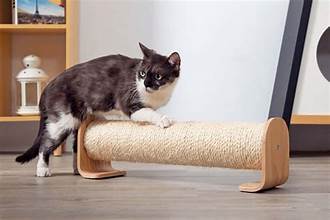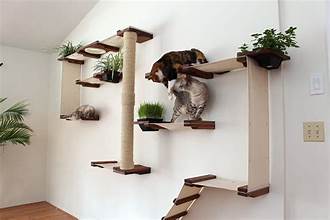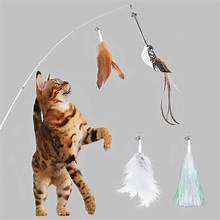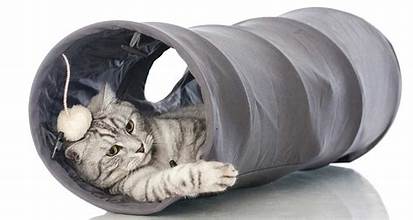Cats thrive in environments that cater to their instincts, such as climbing, scratching, and hunting. Creating a stimulating indoor space keeps your feline friends happy active and healthy. In this guide, we’ll explore tips to enrich your indoor environment and provide your cat with everything it needs for a fulfilling life.
1. Scratching Posts and Pads
Scratching is necessary for cats to maintain their claws, mark their territory, and stretch their muscles.
- Types of Scratching Posts:

- Vertical Posts:
It is ideal for cats that like to stretch upward.
- Horizontal Pads:
Great for cats that prefer scratching flat surfaces.
- Inclined Scratchers:
A hybrid option for variety.
- Placement:
Scratchers should be placed near their favorite spots, such as sleeping areas or furniture they might otherwise scratch.
- Material:
Look for sisal rope, carpet, or corrugated cardboard, which are textures cats enjoy.
2. Climbing and Perching Areas

Cats love to climb and observe their surroundings from high vantage points.
- Cat Trees:
Multi-level cat trees with platforms and hiding spots offer climbing opportunities and cozy resting areas.
- Wall Shelves:
Install cat-friendly shelves or bridges at varying heights for exploration.
- Window Perches:
Provide a sunny spot where they can relax and watch the world outside.
3. Interactive Toys
Toys help mimic hunting behavior and keep cats mentally stimulated.
- Types of Toys:

- Wand Toys:
Great for interactive play sessions.
- Balls and Mice:
Encourage batting and chasing.
- Puzzle Toys:
Challenge your cat to solve problems to get treats.
- Rotate Toys:
Swap out toys every few weeks to maintain interest.
4. Hiding and Resting Spots
Cats need safe, quiet places to retreat when they want to rest or feel secure.

- Cat Beds:
Soft, enclosed beds provide a sense of security.
- Boxes and Tunnels:
Simple cardboard boxes or tunnels can double as play and hiding areas.
- Covered Spaces:
Consider covered furniture or dedicated nooks for ultimate relaxation.
5. Litter Box Setup
A clean, easily accessible litter box is crucial for a happy indoor cat.
- Number of Boxes:
Provide one litter box per cat, plus an extra.
- Placement:
Choose quiet, low-traffic areas to give your cat privacy.
- Cleaning:
Scoop daily and clean thoroughly every week.
6. Environmental Enrichment
Cats need mental and sensory stimulation to stay happy indoors.
- Cat Grass:
Add cat-friendly plants or grass for safe chewing.
- Bird Feeders Outside Windows:
Create a “cat TV” with bird feeders or squirrel-friendly attractions outside a window.
- Music or Videos:
Play calming music or nature videos designed for cats.
7. Playtime and Interaction
Daily play sessions strengthen your bond and provide much-needed exercise.
- Schedule Regular Play:
Engage in short, energetic sessions to mimic hunting behaviors.
- Reward Good Behavior:
Use treats or affection to reinforce positive habits.
Design Tips for Your Indoor Cat Haven
1. Maximize Vertical Space
Cats love to climb, so use vertical space creatively. Install shelves, climbing walls, or tall cat trees to add dimension to your home.
2. Balance Open and Cozy Areas
Cats enjoy both open spaces for exploring and cozy corners for napping. Create a mix of accessible surfaces and enclosed spaces.
3. Make It Stimulating and Safe
Remove hazards like toxic plants, loose cords, or small objects that could be swallowed. Ensure all furniture and perches are stable and secure.
4. Use Cat-Friendly Materials
Opt for durable, easy-to-clean fabrics for furniture and protect delicate items from curious paws.
5. Integrate Cat Features into Your Decor
Modern cat furniture blends functionality with aesthetics. Look for stylish cat trees, scratching posts, and shelves that complement your home’s design.
Benefits of an Enriched Indoor Environment
- Improved Behavior:
It prevents boredom and destructive habits like scratching furniture.
- Better Health:
Regular Veterinary Check-ups:
Regular visits to the vet are crucial for maintaining your cat’s health. They can help prevent potential health issues and ensure your cat’s well-being.
- Mental Stimulation:
It keeps your cat’s mind active, preventing stress and anxiety and giving you confidence in your ability to provide a stimulating environment.
- Stronger Bond:
Interactive play and engagement help strengthen your relationship with your cat, empowering you as a cat parent.
Conclusion
Creating the best indoor environment for your cat doesn’t require a complete home makeover—just thoughtful adjustments to cater to their instincts and needs. By incorporating scratching posts, climbing areas, toys, and cozy spots, you can provide your cat with a stimulating and comfortable space they’ll love.
What’s your cat’s favorite indoor feature? Share your tips and experiences in the comments below! We’d love to hear how you’ve created a stimulating indoor environment for your feline friend.




